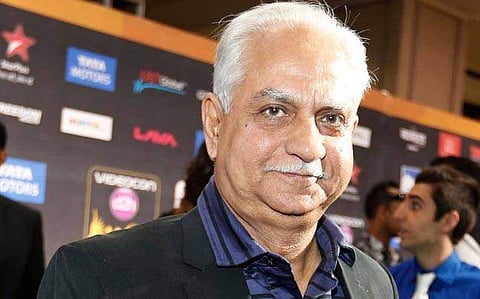

Not all films are accorded the status of being iconic, but Ramesh Sippy's magnum opus, Sholay, that recently completed its 45th anniversary, passes all tests of enduring greatness. In the latest edition of Time Pass, a series of webinars organised by The New Indian Express group, the legendary filmmaker took a walk down memory lane to Ramgarh, as he fielded questions from TNIE's Entertainment Editor Sudhir Srinivasan and senior journalist Kaveree Bamzai.
Touching upon the locations the film was shot in, Ramesh said, "We wanted to break away from the usual look in dacoit films then. Through our art director Achrekar, we found Ramgarh in and around Bengaluru. We built no set for it. Even the scenes involving Thakur and Basanti were shot largely outdoors. Our decision clearly worked out.” He then went on to correct some of the urban legends surrounding this film, one of the greatest multi-starrers in Indian cinema. He rubbished the legend of Sholay not setting cash registers ablaze upon its release. "That’s a myth! It was the most awaited film. When we started filming, Amitabh wasn't yet a star, but when we finished it, Zanjeer and Deewar were out. So, he had become a star by the time of release. The advance bookings were fantastic." He then rejected the idea that he had flirted with the possibility of changing the ending of Sholay. "I wanted to show the death of Gabbar but the censors didn't like how we had shot it. They didn't want police officers being shown to take law into their hands. It was a point of controversy, and remember that it was a time of Emergency. And then, of course, there was the hue and cry over Amitabh’s death."
Sholay, one of the greatest Indian films, was unanimously panned by critics at the time of its release. Ramesh agreed: "They dubbed it the end of Bollywood. How could we make such an expensive film with such themes? It took them seven weeks to admit that they had made a mistake with their judgment." But even then, no one might have expected this film, written by the iconic Salim-Javed duo, to gather the following it has since then. "You can put in your best efforts, make it technically polished, and get the best out of your actors. Those aspects can be planned. But a phenomenon is something that happens when all these come together in a way that cannot be planned on paper."
The film has gone on to set the template for masala cinema, with films over the decades adopting many of its ideas. Some of the tropes though, like the idle chatter of Basanti going on to define a generation of heroine roles, haven’t exactly been beneficial. Ramesh observed that it’s natural for filmmakers to take inspiration. “But as a filmmaker myself and a teacher of cinema too, I wish they wouldn’t take just caricatures of the original roles. I wish they would also understand the essence of strong characters like Basanti.”
As a veteran in the industry, how does the filmmaker see the ongoing debate of nepotism? "Talent matters a lot,” he said. “Look at people like Bachchan who came from the outside. Nepotism hasn't stopped careers from happening. Of course, there are advantages of being part of the cinema family. It happens in every other industry as well. It might help when you are starting out, but to actually be something, it is all about your talent and how you take it forward."
When the topic veered to the untimely demise of actor Sushant Singh Rajput, and how it has resulted in these debates, he said, "It is a controversy because there is an emotional angle attached to it. He was a wonderful talent and a fine actor, and his death is lamented. It is unfair to talk about it."
With this being the season of sequels and prequels, is there a possibility of Sholay ever getting a sequel? "I was never for it. I may be wrong, but I was firm that Sholay was so entrenched in people’s minds that it wouldn’t make sense to have a follow-up. A prequel perhaps? But then again, why do I need to have a follow-up, when the original is being talked about 45 years after its release?"